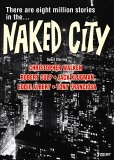| Reviews & Columns |
|
Reviews DVD TV on DVD Blu-ray 4K UHD International DVDs In Theaters Reviews by Studio Video Games Features Collector Series DVDs Easter Egg Database Interviews DVD Talk Radio Feature Articles Columns Anime Talk DVD Savant Horror DVDs The M.O.D. Squad Art House HD Talk Silent DVD
|
DVD Talk Forum |
|
|
| Resources |
|
DVD Price Search Customer Service #'s RCE Info Links |
|
Columns
|
|
|
Naked City - Set 3
THE SHOW:
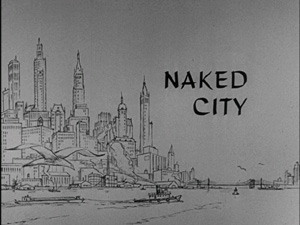
I wanted to start this review off with something original. I wanted to be clever and not cliché, and avoid the opening I am sure just about every critic has used when discussing Naked City, including my fellow DVDTalkers. It's just too good, though, too hard to resist. So...
There are eight million stories in the Naked City, and these are twelve of them.
Ahhhh, that was fun.
You know you would do it, too. It has to be the most famous tag line to a show that not a lot of people have heard of. It's too bad that Naked City wasn't bigger in the syndicated rerun game, because it's quality television. Thank goodness that Image Entertainment is making sure it doesn't go away. This is their third set of twelve episodes, three DVDs in all, each ending with the narrator letting us know where we were, how many people live there, and that it was one of their lives we just witnessed.
For those not in the know, Naked City is kind of the prototype for Dick Wolf's career, but without the impersonal approach to the crimes. Just as Wolf has done in Law & Order, the police officers in Naked City exist as nuanced characters only when in service to the story. Our core three, Detective Adam Flint (Paul Burke), his partner Sgt. Frank Arcaro (Harry Bellaver), and their boss, Lt. Mike Parker (Horace McMahon), have outside lives--we meet girlfriends and mothers, and hear references to others--but anything beyond their precinct house is really an intrusion, something to get in the way of them being good cops.
The focus of the series, really, is the people who commit the crimes and their victims. Naked City is basically an anthology series, and from week to week, we are introduced to a new cast of characters that we follow from the opening of their most recent tragedy to the seal being shut on their case. The tone can shift from straightforward procedural stuff to absurd comedy to melodrama, and each episode stands on its own. Sometimes, in fact, the crime takes a backseat to everything else going on, and if there is ever a failing of an individual installment, it's usually that the climax is too rushed; otherwise, the standard of the writing is always top-notch.
The same can be said for the other aspects of the production. Shot on film, the show's directors never forget that the titular city is also its own character. Naked City's exteriors were filmed on location in New York, and some of the outside shots are amazing. For instance, in the episode "No Naked Ladies in Front of Giovanni's House," the viewer is treated to some splendid footage of one of New York's harbors. When Giovanni goes running past the water, it reminded me of the climax of Jules Dassin's Night and the City--which is no great leap of a comparison as Naked City was based on Dassin's '40s movie of the same name, and much of his clean approach to hardboiled material is retained.
On that same tack, the city yields the kind of colorful characters that have made the Big Apple so compelling for storytellers over the years. Only in New York would you find the outlandish tenants of the aforementioned "Giovanni's House" or the very ethnic collection of workers in "One, Two, Three, Rita Rakahowski." The other benefit of shooting in New York is the host of talented actors the producers could draw from when casting these roles. This collection alone includes Eddie Albert, Robert Culp, Jean Stapleton, Jack Klugman, Al Lewis, Tom Boseley, and a very young Christopher Walken, back when he was going by the name "Ronnie." With music by Nelson Riddle, the big-city feel is complete.
The third DVD set of Naked City draws from the second half of the show's final season. So far, Image has chosen to release the series as "best of" compilations, picking and choosing the finest episodes. Given the nature of the series, this doesn't present a problem. The only ongoing story line is whether or not Detective Flint will ever marry his longsuffering girlfriend. (Though, there is an episode where Flint shows up wearing an eyepatch, and I wondered if he was injured in one of the episodes we missed.) Thus, there are no duff tracks among the lot, even if some episodes are better than others.
Disc 1
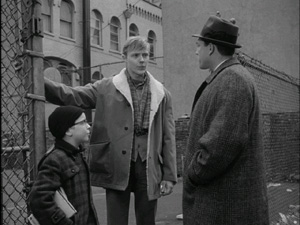
* "The Virtues of Madame Douvay": The murder at a French restaurant is little more than an excuse to explore the parallel lives of two couples whose relationships have become strained--the immigrant restaurateurs and one of our police detectives, Adam Flint, and his actress girlfriend. This is a good choice to lead off the new set, as it reintroduces us to the cops and reminds us of Adam's romantic situation; however, it's one of the cases where the writing falters a little. The killer's confession comes out of nowhere, as if he knew the scriptwriter was running out of pages.
* "King Stanislaus and the Knights of the Round Stable": This episode is one of the true prizes of this set. Guest-starring Jack Klugman, it's the story of two friends that have a beef between them. On the day of his first child's birth, Steve (John Larch) invokes an old Polish custom to settle the score with Pete (Klugman). The bulk of the episode is between the two men. They've stowed away in a meat locker with a bottle of whisky and a butcher's cleaver. As they hash over their bad blood, our intrepid cops are scouring the city to find them before they can do too much damage to one another. You see, the custom says that the only way to clear up the bad blood is to spill it. As the men get drunker, the story of what happened actually becomes more clear through expertly timed flashbacks. Klugman and Larch are in top form, descending believably through intoxication all the way down to righteous anger and murderous intent. Delicious!
* "Her Life in Moving Pictures": A quieter installment, all about inner turmoil. A modern-day Lothario is preying upon dowdy maids to gain access to the apartments of their rich bosses. Adam is particularly irked by the amoral gigolo, blazing a trail of animosity that Law & Order: SVU's Detective Stabler started walking decades later (how many times has Christopher Maloney seen this episode, I wonder?). As the police try to get one of the man's victims to open up, Adam starts to question the lengths he'll go to in order to catch a perp. Watching it, I changed my mind as many times as he did, which is a testament to how well the tough subject is handled.
* "Robin Hood and Clarence Darrow, They Both Went Out with the Bow and Arrow": The big selling point of this selection is the very young Christopher Walken before he had fully unleashed his full Walken-ness. While it's fun to hear him spout some TV writer's version of bebop teenager lingo, the episode really belongs to Eddie Albert, who plays his father. Albert runs a small liquor store and is still grieving over his wife, who passed away a year before. When he sees one of his friends die as part of a rash of liquor store robberies, the world begins to look like an emptier place. He crafts a trap for the robbers, making himself a target so he can exact revenge and prove to his two boys that there are things a man can do that matter. Albert brings a real inner strength to his performance. His emotions smolder to a fire his character is ill-equipped to handle, and with the differing opinions of the investigating officers acting as a sort of Greek chorus, Naked City once again avoids an overly easy resolution to its morality play.
Disc 2
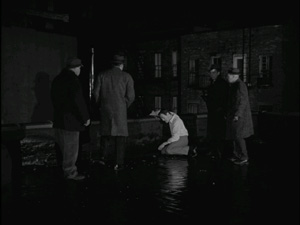
* "The Apple Falls Not Far From the Tree": Keir Dullea would become most famous for his stone-faced portrayal of Dave in 2001, but here he plays a much more expressive role: a juvenile delinquent. Les puts on a good act for his parents and their society friends, but his outside life grows more warped as his crime spree escalates. The soul of the episode is in the family dynamic, however, with the mother who secretly drinks and the well-meaning father who refuses to see the bad in his loved ones. These upper-crust failings are the real source for Dullea's double life. He's been taught to keep secrets, and he does it well.
* "The Highest of Prizes": Naked City was never afraid of playing with structure. In "The Highest of Prizes," our focal point is an immigrant newspaper salesman who has deadlocked a jury he's on because he believes that the D.A. has not proven that the man on trial (Robert Culp) killed his wife. Over the course of the deliberations, we learn about the case through flashbacks, sometimes the same event played twice, changing color based on the narrative testimony. Meanwhile, Det. Flint continues his search for clues, hoping to beat the clock and prevent a dire denouement. Culp eventually loses his cool, and his coming apart is a treat of over-the-top acting.
* "On the Battle Front: Every Minute Is Important": One of the more frustrating episodes of the set, because it could have been so much better. In the dead of night, three men walk into a building to rob it, the plan goes horribly wrong, and only two men walk out. Flint and Arcaro try to unravel the baffling scheme. The only objects taken were useless, so the motive is unknown. Unfortunately, the writers get sidetracked with a somewhat ludicrous side plot where the possible victim (David Janssen from The Fugitive) wants to hire Adam as his successor in his ad agency. This eats up a lot of time, leaving not nearly enough for the far more clever robbery plot.
* "No Naked Ladies in Front of Giovanni's House!": Occasionally, Naked City slides into humor, as in this episode about a whackjob New York landlord (Harry Guardino) who is convinced that his building is somehow the embodiment of his dead father. With four egghead graduate students logging his every move, the police try to keep Giovanni on track as he heads for a breakthrough into adulthood--and the altar. For as absurd as it is, it actually works quite well. The matching glasses and bad haircuts on the graduate students are particularly amusing, and Giovanni's drunken rant against the absent old man is the right blend of funny and sad.
Disc 3
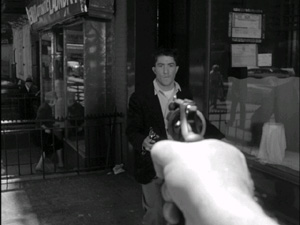
* "The S.S. American Dream": John Larch returns, this time playing a junk salesman who dreams of one big score: a rusty freighter he can break down for scrap. When his business partner objects, Larch murders him, and it's like pulling the support peg out from under an overly complicated life. Contending with his mistress, the sick child of one of his employees, a henpecking wife, an evil loan shark, and the weight of his own guilt, Larch's juggling act tumbles down around him. Larch is once more outstanding, letting each blocked avenue register on his withering face.
* "One, Two, Three, Rita Rakahowski": This is the weakest episode amongst the selections. Det. Arcaro is pulled into a love triangle at a warehouse for packing products. There is some good comedy as the jilted stock boy Gorilla (Anthony Franciosa) incites his fellow workers to riot. Once again, the work force is made up of amusing types, and Franciosa gives an incredibly physical performance, scrambling over stacks of flattened boxes and swinging on pipes. By the end of the show, however, the jungle motif is pushed a little too far, and the Tarzan-style ending plays as ludicrous rather than dramatic.
* "Golden Lads and Girls": I'm not sure, but I don't believe alcoholism and domestic violence were two topics that received much airplay in 1963, but "Golden Lads and Girls" tackles them both. Two separate families suffer the same problem on the same day: daddy has gotten off of work, drank himself into a rage, and got so violent, the cops had to be called. The difference between the two is that one family is wealthy, the other poor. As they travel on parallel paths through the system, the story zigzags between the two, showing that no matter how far apart they think they might be, everyone's problems are the same. It's deftly handled, touching on issues of class and addiction recovery, with understated performances that keep the show from being too cartoony or too preachy.
* "Barefoot on a Bed of Coals": Steven Hill is perhaps best known for his decade-long stint as District Attorney Adam Schiff on Law & Order; twenty-seven years earlier, he played Stanley Walenty, a barber who always dreamed of being a cop. Rejected by the academy, he takes matters into his own hands and walks around in a fake uniform dispensing minor doses of justice. The charade goes awry when he tries to foil a robbery perpetrated by a twitchy crook (a baby-faced Dustin Hoffman). As the real cops look for him, Stanley has to somehow find a way to make his fantasy and his reality jibe so that he can hold his head up high. Hill gives Stanley the right balance of shyness, his odd gait a signal to his quiet nerves. There is also some impressive camerawork in this episode, including a perspective shot where we are watching the gun in Stanley's hand from his eyes.
THE DVD
Video:
Image does an amazing job restoring their Naked City sets. The beautiful black-and-white is crystal clear, and there are no snaps, crackles, or pops. I can't imagine these shows looked this good when they first aired in 1963. Because it's television, Naked City's full-frame presentation is its proper 1:33:1 format.
Sound:
There is no fancy modern mix, just a Dolby Digital Mono mix, which is fine, because it sounds excellent. Street noise comes through with absolute clarity, and Nelson Riddle's music is given the proper power in the mix.
Extras:
Just like the previous Naked City collections, the only extras on offer are the often amusing commercials that aired with the original broadcast. There is a play-all function on this feature so that the commercials can be viewed back-to-back. It would have also been nice to be given the same option on the episodes.
FINAL THOUGHTS:
Recommended. They don't make TV like Naked City anymore, particularly these days with all the science and procedural cop shows. Naked City was about characters, not fancy tricks and gadgets, with intelligent stories about how one person is pushed to desperate measures while others are not. Complex writing, fantastic performances, and gorgeous black-and-white cinematography--as well as a ratio of only one in four of the episodes even containing a minor nit for me to pick--make these DVDs ones you'll likely revisit often.
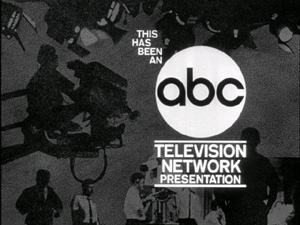
Jamie S. Rich is a novelist and comic book writer. He is best known for his collaborations with Joelle Jones, including the hardboiled crime comic book You Have Killed Me, the challenging romance 12 Reasons Why I Love Her, and the 2007 prose novel Have You Seen the Horizon Lately?, for which Jones did the cover. All three were published by Oni Press. His most recent projects include the futuristic romance A Boy and a Girl with Natalie Nourigat; Archer Coe and the Thousand Natural Shocks, a loopy crime tale drawn by Dan Christensen; and the horror miniseries Madame Frankenstein, a collaboration with Megan Levens. Follow Rich's blog at Confessions123.com.
|
| Popular Reviews |
| Sponsored Links |
|
|
| Sponsored Links |
|
|
| Release List | Reviews | Shop | Newsletter | Forum | DVD Giveaways | Blu-Ray | Advertise |
|
Copyright 2024 DVDTalk.com All Rights Reserved. Legal Info, Privacy Policy, Terms of Use,
Manage Preferences,
Your Privacy Choices | |||||||









